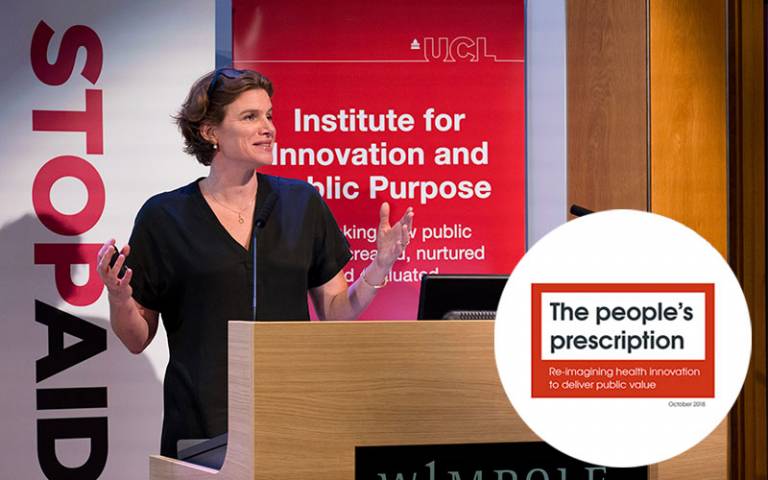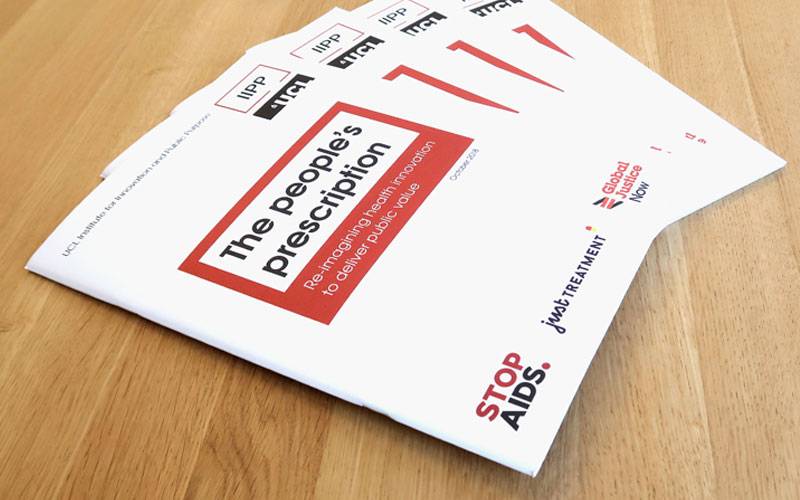Labour Party draw on IIPP health innovation research for new pharma policy
25 September 2019
UCL Institute for Innovation and Public Purpose (IIPP) alongside co-authors of the People's Prescription report reacts to Jeremy Corbyn's announcement of a range of policies to tackle the failings of innovation in the pharmaceutical sector.

Professor Mariana Mazzucato has today welcomed the Labour Party addressing the innovation model of the pharmaceutical sector in which the risks of R&D are socialised whilst the benefits go to private sector. Health campaigners have welcomed Jeremy Corbyn’s announcement of a range of policies to tackle the failings in the pharmaceutical sector in his speech to the Labour Party conference yesterday afternoon. As authors of the People's Prescription report, which maps the fault lines of the current health system and sets out principles for a new one, IIPP, Global Justice Now, Just Treatment and STOPAIDS has welcomed this announcement and recommendations outlined in the Labour Party's new policy paper on transforming public health.
To shift the pharmaceutical industry towards a more equitable model rather than a model driven by profit, the Labour Party has pledged to create a publicly-owned company in order to produce affordable medical treatments for people who need them. It was also announced that in order to receive public research funding, drug companies would be required to produce affordable medicine for all.
Professor Mazzucato, Director and Founder of IIPP said:
It is welcome that the Labour Party is addressing key failures of the pharmaceutical sector. When the government funds the development of new medicines it must do so in a systematic way to make sure that the benefits reach the patients that need them. Instead, we currently have a system where the risks of innovation are socialised, while the benefits are privatised through dysfunctional uses of intellectual property rights, a financialised business model, and a pricing system that does not recognise taxpayer investment. At the UCL Institute for Innovation and Public Purpose we have been working with global leaders, from all sides of the political spectrum, to change this, and are happy that it is becoming central to the Labour Party’s platform.
The pharmaceutical sector is incentivised to set high prices and deliver short-term returns to shareholders, rather than focus on riskier, longer-term research which leads to critically needed therapeutic advances.
A thriving health innovation system should generate new health technologies that improve public health and ensure access to effective treatments for the people who need them. However, our current health innovation system fails to direct innovations towards the greatest health needs, and is fraught with inefficiencies: when innovation happens, it happens more slowly and at great cost. The high prices of medicines are causing severe patient access problems worldwide, with damaging consequences for human health and wellbeing.
Christina Walker, mother to Luis (9) who has cystic fibrosis has been campaigning with Just Treatment for access to a medicine called Orkambi which is currently priced too high for the NHS in England, said:
My child’s future is being put in jeopardy by the behaviour of one pharmaceutical company - Vertex. But it’s not the first or the last time that excessive profits have been put above patients’ health, and with 7,000 rare diseases currently without an effective treatment or cure, our situation could be replicated many times over in the future if the government doesn’t intervene now. Across the NHS the high price of new medicines is causing huge strain, affecting the lives of patients with conditions ranging from cancer to hepatitis. Most people recognise that major reforms are needed. Quite clearly drugs don’t work if patients can’t take them. I’m pleased to see that Labour are willing to explore every alternative to tackle this access to medicine crisis. I call on the government and other parties to do the same.
Read the People's Prescription report
In the media
Labour pledges to break patents and offer latest drugs on NHS, The Guardian
Labour government would use compulsory licensing for expensive drugs, PharmaPhorum
Contact
For more information on the People's Prescription report, please contact Henry Lishi Li: henry.li@ucl.ac.uk
 Close
Close


